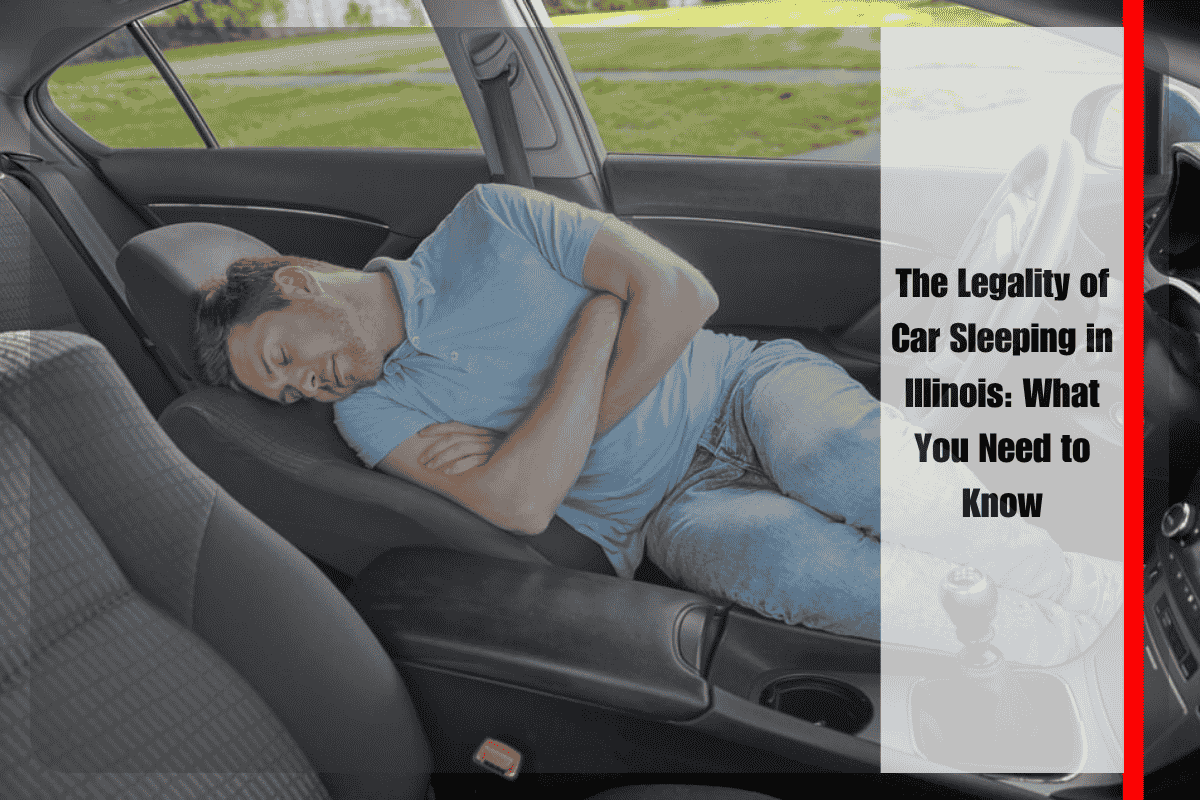Finding a safe and comfortable place to sleep during long road trips or when you’re in need of rest can sometimes lead people to sleep in their cars. While it may seem like a convenient and harmless option, sleeping in your car in Illinois comes with certain legal considerations. In this article, we will explore the rules surrounding car sleeping in Illinois, the potential risks, and the rights of individuals who choose to sleep in their vehicles.
Understanding Illinois Laws Regarding Sleeping in Your Car
In Illinois, the laws surrounding sleeping in your car can be complex. There is no state law that directly addresses sleeping in a car, but local ordinances, parking regulations, and public safety rules can all come into play. In general, it’s legal to sleep in your car in Illinois as long as you are not violating any local laws or ordinances. However, where and when you park, along with the duration of your stay, may determine whether you are within the bounds of the law.
For instance, parking in private lots without permission can lead to legal issues. Many businesses, such as stores or restaurants, may have signs that specifically prohibit overnight parking or sleeping in their parking lots. If you sleep in your car on private property without the owner’s consent, you could be cited for trespassing or asked to move.
Parking in Public Spaces
While it is generally legal to park on public streets or in public spaces for short periods of time, extended stays or overnight parking may be subject to local restrictions. Cities and towns across Illinois may have ordinances that limit or prohibit overnight parking on public streets. For example, some municipalities may have rules that restrict parking for more than a certain number of hours, such as a 12-hour limit. In such cases, parking your car overnight and sleeping inside could lead to a parking ticket or a fine.
Another important consideration is parking in designated areas such as rest stops. Illinois has numerous rest areas along its highways, and many travelers choose to sleep in their cars for a few hours to rest before continuing their journey. Generally, these areas are safe places to park and rest. However, rest areas have their own set of rules that vary depending on the specific location. Some rest stops may have time limits for parking, and sleeping in a vehicle might be discouraged or prohibited during certain hours, particularly after dark.
The Risks of Sleeping in Your Car
While sleeping in your car may seem like a simple solution, there are some risks involved. Even though the act of sleeping in your car is not inherently illegal, various safety and legal issues can arise depending on the situation.
For instance, if you are parked in an unsafe area, such as a poorly lit street or a known high-crime neighborhood, you could be putting yourself at risk for theft or other crimes. Additionally, if you’re parked in a place where it’s clearly prohibited or where you’re violating parking regulations, you could be cited or even towed. Some areas may have strict rules about loitering or sleeping in cars, and breaking these rules could lead to penalties, especially if the vehicle is blocking traffic or obstructing public spaces.
Another important risk to consider is health and comfort. Sleeping in your car is not ideal for long-term rest, and prolonged car sleeping can lead to physical discomfort or even health problems, especially if your car does not offer enough space for adequate sleep. If your car is parked in extreme weather conditions, either too hot or too cold, there are risks of heatstroke, hypothermia, or dehydration.
Can You Sleep in Your Car on Private Property?
If you are staying on private property, such as a friend’s house or a campground, the rules may be more relaxed. However, if you are on someone else’s property without permission, even for a short period, you could be trespassing. It’s always important to check with the property owner or manager to ensure that you have their consent before deciding to sleep in your car.
Tips for Sleeping Safely in Your Car
If you find yourself in a situation where sleeping in your car is necessary, there are a few tips to help ensure your safety and comfort. First, always park in well-lit and safe areas. Rest areas on highways, established campgrounds, or even some 24-hour businesses (with permission) can be safer options. Avoid parking in areas where you could be seen as loitering, and keep an eye on the local parking regulations to avoid fines or other penalties.
Also, make sure your vehicle is properly ventilated. If the weather is warm, consider cracking the windows slightly to allow for airflow. In colder weather, ensure that your car’s heating system is working properly, but never run the engine for extended periods while parked in an enclosed space.
Sleeping in your car in Illinois is generally legal as long as you’re not violating any local laws, ordinances, or parking regulations. It’s important to be aware of where you park and to check if local rules prohibit overnight parking. While it may be tempting to sleep in your car for convenience or necessity, it’s crucial to consider your safety and comfort. Always ensure that you’re parked in a safe, well-lit area, and be mindful of any legal restrictions to avoid fines or penalties. If you’re unsure about the laws in a particular area, it’s a good idea to research or ask for permission before settling in for the night.
Sources
[1] https://www.boondockersbible.com/learn/illinois-rest-area-rules/
[2] https://us1049quadcities.com/is-it-legal-to-sleep-in-your-car-in-illinois/
[3] https://1440wrok.com/legal-to-sleep-in-illinois-car/
[4] https://teamjustice.com/is-it-illegal-to-sleep-in-your-car/
[5] https://khmoradio.com/sleeping-in-car-laws-illinois/












